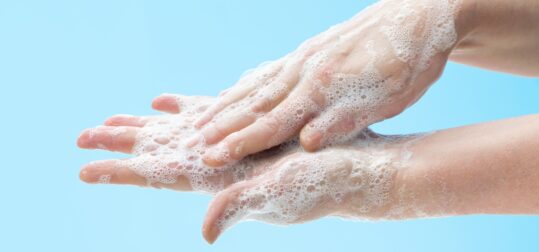Nine in ten nurses suffer skin conditions in hands

Ninety-three per cent of nurses have suffered skin conditions in their hands or wrists in the past year, a Royal College of Nursing survey has revealed, amid fears that hand health has been forgotten during the coronavirus crisis.
The survey – carried out in December 2019, before the pandemic – also found that almost half (46%, or 709) of 1,531 nurses rated their skin condition in their hands or wrists as either ‘poor’ or ‘very poor’, and that over half experienced redness, itching, dryness or cracking.
The results come as the RCN today launched resources to guide nursing staff on the best ways to look after their skin health, particularly as they are washing their hands more frequently at work and at home during the Covid-19 outbreak.
Related Article: NHS plan delivery must equip and empower nurses, midwives and nursing associates
RCN professional lead for infection prevention and control Rose Gallagher said: ‘While the current Covid-19 crisis has thrown a light on the importance of protective equipment for nursing staff, to keep them and their patients safe we still need to try to remember the basics of skin health.
‘Nurses know only too well that if their hands become damaged it can have long-term consequences on their health as well as their career. Despite this, many are not being given the advice they need or the time to protect themselves.’
In addition, the survey found that more than three-quarters (78%) of those with skin problems did not report them to anyone in the workplace when symptoms developed.
Respondents also most often put their hand dermatitis down to glove and soap usage, as well as excessive hygiene including alcohol hand gel – likely to be particularly prevalent during coronavirus.
Younger nursing staff were also shown to be more prone to experiencing multiple skin problems compared to older staff, consistent with previous research showing healthcare staff were more at risk of skin problems early in their career.
Related Article: NMC seeks nursing leader to oversee Code and revalidation reviews
The new RCN resources, produced in collaboration with Mölnlycke and SC Johnson Professional, include advice on maintaining skin health when wearing personal protective equipment, tips on good hand hygiene and guidance on the appropriate use of examination gloves.
Nurses should ensure that if a moisturising cream is being used, it should be applied at least half an hour before donning PPE, and that nursing staff should check their skin for signs of redness or breaks in the skin regularly, it said.
Related Article: Tell us what practice nursing means to you and potentially win £1,000
The NHS surcharge for healthcare staff was also scrapped yesterday in a government U-turn.
Read more: What can we learn from secondary care about hand hygiene?

See how our symptom tool can help you make better sense of patient presentations
Click here to search a symptom


Ninety-three per cent of nurses have suffered skin conditions in their hands or wrists in the past year, a Royal College of Nursing survey has revealed, amid fears that hand health has been forgotten during the coronavirus crisis.



